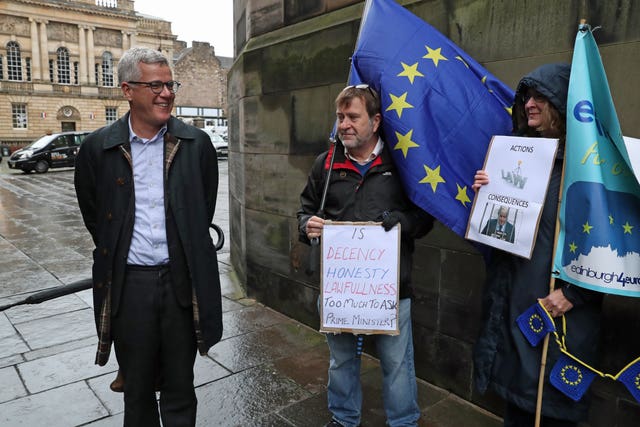Boris Johnson’s Government will ask for a Brexit delay if he fails to get a deal with Brussels despite his “do or die” promise to get the UK out of the European Union on October 31, documents disclosed in court have revealed.
The Prime Minister accepts the terms of the Benn Act, which requires him to seek an extension if a deal has not been agreed with the EU by October 19, according to a submission to Scotland’s highest court on behalf of Mr Johnson.
Downing Street refused to comment after extracts from the document were read out during the case at the Court of Session.
But allies of the Prime Minister suggested that Mr Johnson remained committed to the Halloween date.
The Government is saying that it will send the Benn Act letter and it will not frustrate the Act (i.e. by seeking to persuade a r27 Member State to veto our request for an extension). So what is left of the Prime Minister’s promise that we will leave on 31.10? https://t.co/gsJIMEUkV3
— Jo Maugham QC (@JolyonMaugham) October 4, 2019
The Prime Minister has publicly said “we will obey the law, and will come out on October 31” in any event, without specifying how he would achieve the apparently contradictory goals – fuelling speculation that he had identified a loophole to get around the Benn Act.
He has also declared he would rather be “dead in a ditch” than ask for a delay.
Any extension to the Article 50 process – the mechanism by which the UK leaves the European Union – would have to be agreed by all 27 other EU leaders.
The legal action – led by businessman Vince Dale, SNP MP Joanna Cherry QC and Jolyon Maugham QC – is asking the court to require Mr Johnson to seek an extension to avoid leaving the EU without a deal.
Andrew Webster QC, representing the UK Government, said the documents it has submitted to the court are a “clear statement” as to what the Prime Minister will do.
He argued there is no need for an order to be made forcing a letter requesting an Article 50 extension to be sent under the terms of the Benn Act, because the court has it on record it will be sent.
Mr Maugham told the PA news agency the Prime Minister’s submission said “he would send the letter mandated by the Benn Act” and would not “frustrate” attempts to get an extension.
He said: “That means that it’s impossible for him to say, as he’s been telling Parliament and indeed the rest of us, that we will leave the EU on October 31 come what may.
“That is no longer a true statement – if ever it was a true statement of the law – and the Prime Minister acknowledges that.”
Mr Maugham added: “We want to see the courts tell him that ‘unless you send the letter, no later than October 19, unless you cease trying to frustrate Parliament’s intention, there will be personal consequences for you, you could go to prison’.”
But Eurosceptic MP Steve Baker – the self-styled “Brexit hardman” – insisted that the Prime Minister would still meet the October 31 date.
A source confirms all this means is that Government will obey the law.
It does not mean we will extend.
It does not mean we will stay in the EU beyond Oct 31.
We will leave. https://t.co/LuVt45rMAr
— Steve Baker MP (@SteveBakerHW) October 4, 2019
Mr Baker, leader of the European Research Group of Brexiteer Tories, told PA: “A source has confirmed that this just means the Government will obey the law but the source confirmed we will leave on October 31.
“It’s not really a development in the position.”
But Mr Baker said he did not know what the Government’s plan was to get around the Benn Act if necessary.
If Mr Johnson – who wants an early election – did request a delay it could play into the hands of the Brexit Party.
The party’s leader, Nigel Farage, said: “Boris said we would leave by October 31 ‘do or die’.
“Why does he keep saying things that are not true?”
The Independent Group for Change leader Anna Soubry was reassured that no deal is increasingly unlikely on October 31, but told PA “you can’t trust a single word” the PM says.
Meanwhile, Brexit talks with Brussels on Mr Johnson’s plan to replace the backstop could continue over the weekend.
Brussels said that “every day counts” as the clock ticks down to a crunch summit of EU leaders on October 17-18 and Downing Street said “we are ready to talk at any point, including over the weekend”.
The Prime Minister is expected to embark on a tour of European capitals for face-to-face talks next week as well as continuing to speak by phone to counterparts.
European Commission spokeswoman Natasha Bertaud said: “What we have always said is that every day counts, especially as we near the end of October.”

Downing Street also indicated the Government would consider publishing the full legal text of Mr Johnson’s proposals, which have so far only been shared confidentially with Brussels.
Mr Johnson’s plans would see Northern Ireland apply EU rules on goods but stay in a customs territory with the UK.
This would create a regulatory barrier for goods crossing the Irish Sea and create a customs border between Northern Ireland and the Republic of Ireland – but Mr Johnson has insisted there would be no need for checks or infrastructure at the frontier.
Irish deputy prime minister Simon Coveney said: “We don’t see how the proposal to have two different customs territories on the island of Ireland can avoid customs checks between those territories.”






